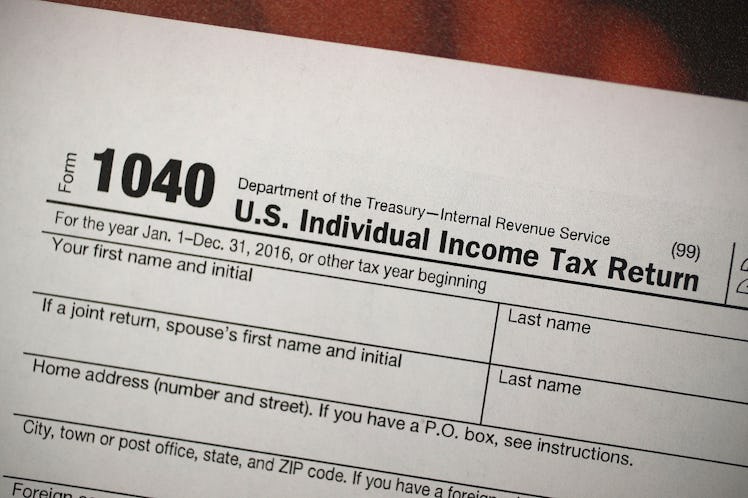
Here's How Your College Tuition Can Help You This Tax Season
I get it, being a college student is expensive. Like, stupidly expensive. But the good news is, you can write off college tuition on your taxes, so get your files in order. Whether you're a first-time student and your parents are helping you cover the costs, or a veteran student paying the bills alone, there are multiple ways to use your tuition to your advantage.
Tax breaks can be confusing, but there are two basic ways that you can save money on taxes through your tuition and related expenses: credits and deductions. A deduction can reduce the overall amount of tax you pay by subtracting from your taxable income (the lower this number, the less you owe). On the other side, credits are applied to the actual amount of taxes you would end up owing the government, subtracting from your overall bill.
There are a few major cards you can play here, but most are mutually exclusive, meaning you either can't claim more than one deduction or credit, or can't double-dip and claim the same expense twice. Do some math ahead of time (or let a tax calculator do it for you) to see which one will give you the best bang for your buck.
Pro tip: Scholarships and fellowships — assuming they were used to pay for tuition and not, say, rent — are also not subject to tax.
Credits
Per the Internal Revenue Service (IRS), the two credits for education you can claim are the American Opportunity Tax Credit (AOTC) and Lifetime Learning Credit. Both credits have the same three requirements (explained below) in order to claim them (plus a few specific ones). You can't claim both credits at the same time, so be sure to calculate which will give you a better deal in the end before you choose which one to claim.
First, the student must also be the filer — or their spouse or dependent (claimed on their taxes). Second, the expenses have to be paid by the filer, the dependent, or a third party. And finally, you must be enrolled at an eligible institution, which includes most post-high school institutions like colleges, universities, academies, and trade schools.
For the AOTC, the maximum amount you can credit toward your owed taxes by is $2,500. Here's the cool part, especially for low earners: If you owe less than that in taxes to begin with, whatever the difference may be refunded to you at 40 percent (up to $1k). Nice!
In order to get that credit, the additional standards aren't too tough. Students just have to have been enrolled at least half-time at a qualifying institution for one or more academic periods during that tax year, and not have a drug felony. Pretty straightforward, right? The caveat: You can only use this credit for up to four tax years, and only people earning $80k or less in income annually can claim the credit. (If you're a college student making more than that, please, let's talk.) Get more details and forms to claim the AOTC here.
The Lifetime Learning Credit can reduce your tax owed by up to $2k for each tax year, and it works for not just four-year undergrad programs, but for any education at any time, granted it's at an eligible institution. It only applies if you make $66k or less, but there's no limit on the number of years you can use this one, so plan strategically.
As for requirements, you simply have to be enrolled at an eligible institution for at least one academic period. There's no minimum level of enrollment, but you have to be taking courses towards a degree, skill, or credential. (Those spin classes you took at the university gym for fun probably won't count.)
One more note on that. Be sure, as the IRS recommends, to keep documentation of any forms you fill out, just in case there's any discrepancy.
Deductions
Thanks to the new tax bill of 2018, as Turbo Tax explains, there's a Tuition and Feeds Deduction for educational expenses for those who don't qualify for either of those two credits. Again, this one can't be claimed for expenses that were already claimed by either of those credits.
This one mostly applies to parents who are claiming their children in school as dependents and paying their educational expenses, or for students who are not dependents and are footing the bill themselves. This deduction might be smaller, or can be eliminated altogether, if you're raking in the big bucks.
Parents claiming their children cannot write off any expenses that their dependents paid themselves — so if mom and dad only bought a few books here and there, that's all they can claim.
There's also a Student Loan Deduction (more on that here), and Business Deduction for Work-Related Education. Loans taken out to pay for things like room and board, books and supplies, tuition, or other education-related necessities are eligible for tax breaks. The business deduction applies generally if your employer requires you to get more education in order to keep your job, such as learning or maintaining a skill, or getting a certification.
Happy tax filing!